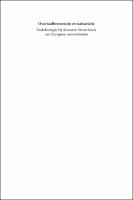Over taalbewustzijn en taalvariatie
Taalideologie bij docenten Nederlands aan Europese universiteiten
| dc.contributor.author | Wilde , Truus de | |
| dc.date.accessioned | 2020-01-14 11:07:13 | |
| dc.date.accessioned | 2020-04-01T09:15:27Z | |
| dc.date.available | 2020-04-01T09:15:27Z | |
| dc.date.issued | 2019 | |
| dc.identifier | 1006700 | |
| dc.identifier | OCN: 1147278971 | |
| dc.identifier.uri | http://library.oapen.org/handle/20.500.12657/23451 | |
| dc.description.abstract | The study scrutinizes the effects of language awareness on teachers’ conceptualization of language variation. Teacher language awareness has been discussed mostly for the case of English and with regard to grammar, and is defined as being determined by knowledge and reflexion (Andrews 2008, Svalberg 2012). This study aims at examining the reach of the concept for other languages, here Dutch, and for other terrains, in this case, language variation, thus stretching the application also into the realm of language ideology. According to Kroskrity (2006, 2016), language ideologies are (1) not knowledge but ‘‘notions’, ‘beliefs’ or ‘ideas’, which (2) are about language, the role(s) of language and its nature, and which (3) are constructed by individuals and groups in interaction with each other to (4) rationalize and justify social relations. In this linguistic-ethnographic study, a qualitative analysis of semi-structured interviews with teachers of Dutch at eight European universities shows that knowledge and reflection play a considerable role for how teachers conceptualize language variation in class. Overall, four different types of teacher language awareness came to the fore, based on different interplays of both knowledge and reflection: standard language ideology alive, strong focus on prescription, doubting and linguistic insecurity and dynamic equilibrium. The overall results show the importance of teacher language awareness in language classes and help to boil down the vague notion of language awareness on language variation to two major defining factors, namely knowledge and reflection. Further, the study shows that language classrooms may be seen as ‘ideological sites’ (Silverstein (1979, 1998)), in which language ideology may be either reproduced or deconstructed, depending on the language awareness of the teacher. The consequences of the study for language teacher education are a plea for an informed, reflected, differentiated and integrative treatment of language variation in language class. | |
| dc.language | Dutch; Flemish | |
| dc.relation.ispartofseries | Lage Landen Studies | |
| dc.subject.classification | thema EDItEUR::2 Language qualifiers::2A Indo-European languages::2AC Germanic and Scandinavian languages::2ACD Dutch | en_US |
| dc.subject.classification | thema EDItEUR::2 Language qualifiers::2A Indo-European languages::2AC Germanic and Scandinavian languages::2ACF Flemish | en_US |
| dc.subject.classification | thema EDItEUR::C Language and Linguistics::CF Linguistics::CFB Sociolinguistics | en_US |
| dc.subject.classification | thema EDItEUR::C Language and Linguistics::CJ Language teaching and learning::CJC Language learning: specific skills | en_US |
| dc.subject.classification | thema EDItEUR::J Society and Social Sciences::JN Education::JNM Higher education, tertiary education | en_US |
| dc.subject.classification | thema EDItEUR::J Society and Social Sciences::JN Education::JNT Teaching skills and techniques | en_US |
| dc.subject.classification | thema EDItEUR::J Society and Social Sciences::JN Education::JNU Teaching of a specific subject | en_US |
| dc.subject.other | Education | |
| dc.subject.other | Higher education | |
| dc.subject.other | language | |
| dc.subject.other | Foreign language | |
| dc.subject.other | Dutch | |
| dc.subject.other | Sociolinguistics | |
| dc.subject.other | teaching | |
| dc.subject.other | Language ideology | |
| dc.title | Over taalbewustzijn en taalvariatie | |
| dc.title.alternative | Taalideologie bij docenten Nederlands aan Europese universiteiten | |
| dc.type | book | |
| oapen.abstract.otherlanguage | Taalvariatie stelt docenten voor een bijzondere uitdaging: de vraag naar wat (nog net) kan en naar wat fout is. Die vraag is vaak niet zo makkelijk te beantwoorden. Hoe taaldocenten omgaan met taalvariatie, staat in deze sociolinguïstische studie centraal. Met een etnografische methode slaagt Truus De Wilde erin te achterhalen hoe docenten reageren op taalvariatie en analyseert ze achterliggende motieven. Taalideologieën over wat een standaardtaal is en zou moeten zijn, liggen aan de basis van deze analyse. Op basis van deze ideologieën worden vier archetypes geconstrueerd. De vele citaten uit interviews illustreren de archetypes en wijzen op de centrale rol van taalbewustzijn. | |
| oapen.relation.isPublishedBy | 76cb5309-2a30-44e7-bc8c-7892cd1fa38c | |
| oapen.relation.isFundedBy | 315619dc-aab0-48ba-938b-4ac10c3cc589 | |
| oapen.series.number | 12 | |
| oapen.pages | 220 | |
| oapen.place.publication | Gent | |
| oapen.grant.acronym | Internationale Vereniging voor Neerlandistiek | |
| oapen.remark.public | 21-7-2020 - No DOI registered in CrossRef for ISBN 9789401462440 |

